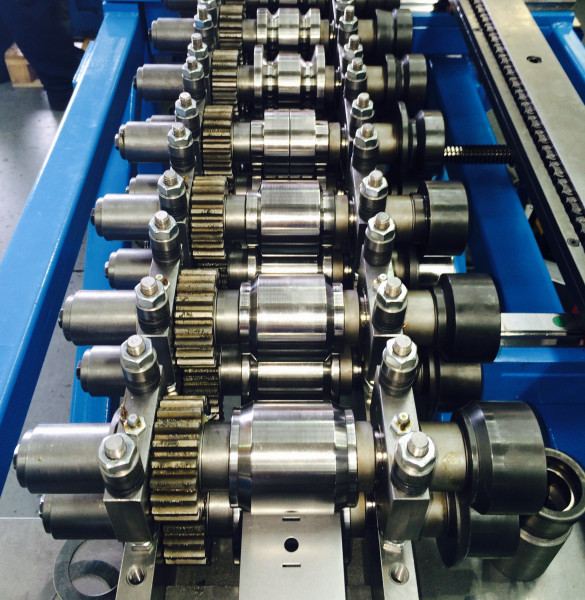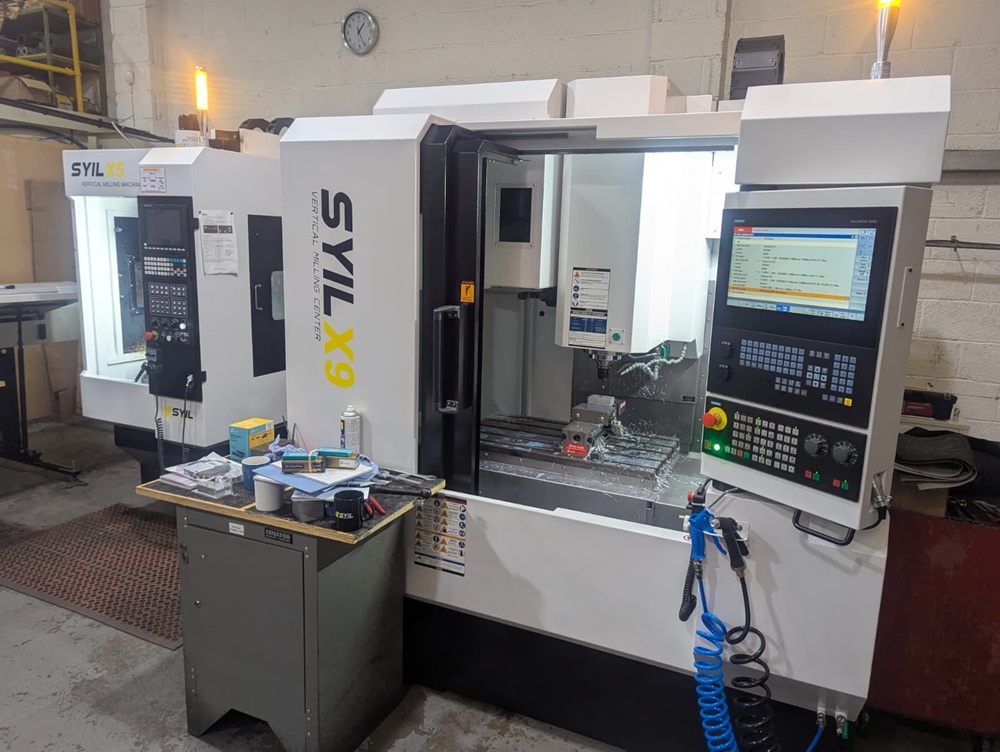A decades-long relationship between a Gosport-based precision engineering company and
cutting tool specialist TaeguTec demonstrates that the right combination of tooling
expertise and new machine tools can unlock substantial productivity gains.
Mathison Engineering, established in the 1980s, has evolved from a one-man operation into
a respected precision engineering business serving the marine, aviation and food industries.
Managing director Steve Mathison, who took over from his father, has recently invested in
new SYIL machining centres that have transformed the capabilities of the business, finally
allowing TaeguTec’s tooling to perform as designed.
The partnership between Mathison Engineering and TaeguTec stretches back over 20 years,
originating with Steve’s father, John Mathison. In this time, TaeguTec has established itself
as Mathison Engineering’s primary cutting tool supplier, with TaeguTec senior technical
sales engineer Iain Lacayo becoming a trusted technical adviser and problem solver.
“Iain has always been our go-to man,” says Steve Mathison. “If there are issues or problems
with machining, he’s been there to help and advise us on the correct tooling, speeds, feeds
and all those little issues that come along which you don’t think of.”
TaeguTec has remained constant throughout the company’s journey, as Lacayo confirms:
“We were one of many initially, but it’s been filtered out. Now, we’re the main supplier for
indexable turning, parting-off and milling tools.”
Mathison Engineering faced a frustrating paradox of high-performance TaeguTec cutting
tools with machinery that could not exploit their full potential.
“Some of our machines were too old; they were struggling to keep up with the
recommended tooling,” says Mathison. “Where TaeguTec tooling could run at speeds well
beyond 20,000 rpm, our machines could never get that fast.”
The company’s three ageing Fadal machining centres, limited to approximately 10,000 rpm,
meant the potential of TaeguTec’s advanced tooling had never been fully utilised.
“We had to divide everything by half – half the speed, half the feed. Sometimes that’s not
good for a tool, but the cutters still did the job better than anybody else’s products.”
Despite these constraints, TaeguTec remained the primary supplier.
“We’ve got all the TaeguTec tool holders and tips,” says Mathison. “The tooling is brilliant, it
works wonderfully.”
The turning point came in March 2025 when Mathison Engineering took delivery of a SYIL X5
machining centre with a 20,000 rpm spindle. The results were immediate and dramatic.
“That machine can turn out work twice as fast compared with our Fadal models: a 100%
productivity improvement.”
For the first time, the machinery and TaeguTec tooling were properly aligned.
Mathison Engineering’s reliance on TaeguTec spans virtually every cutting operation. The
breadth of TaeguTec’s product range means that whether drilling, milling, turning or
parting-off, TaeguTec provides the solution. For milling operations, the company depends
heavily on TaeguTec’s indexable solutions. The WinMill system’s 8 mm two-flute indexable
end mill with CVKT inserts has become indispensable for small slots and detailed work,
effectively replacing solid-carbide tooling with a more economical solution.
“It’s quicker and more repeatable than solid-carbide tools because you don’t have to do
offsets,” explains Lacayo. “You just turn your insert around and away you go. The
Chase4Mill system, with its 90°, four-edged inserts, handles everything from rough milling
to precision shoulder work, while the ChaseMold system with RYMX inserts excels at
stainless steel milling common in marine component work.
TaeguTec’s DrillRush indexable drilling system covers hole-making from 8 to 80 mm
diameter.
“The workhorses at Mathison are the little end mills, indexable tools from 8 to 25 mm
diameter,” says Lacayo.
For turning and parting operations on the CMZ lathes, TaeguTec’s face grooving systems and
parting tools deliver the reliability and surface finish required for challenging marine
applications.
What distinguishes TaeguTec is the consultative approach.
“We quite often pick a tool out of the book, and Iain says no, you want that other one
because it’s got double the number of edges on the tips, for example,” reveals Mathison.
“I’d much rather pay a little more for a tip and have eight edges than just two. He saves us a
lot of money with his knowledge of the TaeguTec range.”
With the SYIL X5 running TaeguTec tools at their designed parameters, improvements across
every metric have been substantial.
“Tools are definitely lasting longer because we’re now able to use the right speeds and
feeds.”
Impressed by the transformative results, Mathison Engineering has purchased a SYIL X11
machining centre with a five-axis rotary table.
“We’ve never done five-axis before, but when we need to talk to someone about five-axis,
we go straight to Iain for his advice.”
TaeguTec is already positioned to support this development. The X11 is equipped with 20
bar coolant pressure specifically to enable TaeguTec’s Typhoon high-speed machining
system.
“We’ve already started asking Iain questions about the Typhoon and how it works,” says
Mathison. “We’ve now got the equipment that will handle his tooling, allowing us to take on
more complex work.”
Operating at 35,000 rpm with high-pressure coolant delivery, the Typhoon system will
enable even more aggressive cutting parameters.
“The X11 will take Mathison into the area where small cutters are in the ideal window of
where they should be,” explains Lacayo.
The relationship extends well beyond cutting tools. Mathison particularly appreciates
TaeguTec’s comprehensive spare parts support: “We can buy screws, seats, clamps –
unbelievable. We can buy those parts, so the expensive holder doesn’t become obsolete.
We can just refurbish it, and we’re off and running again.”
Looking ahead, TaeguTec is working closely with SYIL to provide integrated tooling packages
for new machine installations through a voucher programme. This ensures that from day
one, machines and tools are optimally matched.
“Now the tooling and the machine are paired together; they work well as a team,”
concludes Mathison. “That’s what makes the difference.”
For Mathison Engineering, that team will always include TaeguTec as the go-to solution for
every cutting challenge. As the relationship between Mathison Engineering, TaeguTec and
SYIL continues to strengthen, it serves as a compelling study in how long-term supplier
partnerships, expert technical support and perfectly matched tooling solutions combine to
deliver measurable, transformative business benefits.
More information www.tageutec.com



















